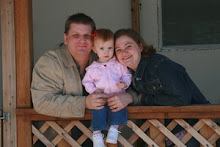I am excited to announce that I am going to receive one of the TNIV Renaissance Bibles when they come out. I so appreciate Rick Mansfield for allowing me to be a participant in the giveaway.
Since I probably do not have a wide crowd of people reading my blog, for those of you who do not know, the TNIV is an update of the New International Version of the Bible.
Now it is difficult to explain here in a few paragraphs the importance of knowing which translation of the Bible you may be reading, and also knowing how the canon of scripture we call the Bible came to be. Someone once told me, "you mean the Bible wasn't originally written in the King James Version?" I had to chuckle and say "no." It was originally written in Hebrew, Greek and some Aramaic words as well. Which means not only do translators and scholars have to translate the language into accurate meanings, but they have to go through knowing different time periods and cultures to bring an clear, concise and understandable translation into English - not just for Americans, but for English speakers of all ethnic backgrounds.
This is part of the reason why I love the TNIV. I believe that it is a balanced view of translation and biblical scholarship and also takes out previous gender biases.
I know alot of well meaning Christians would say, "oh, we all understand that it means people when it says "men." Take for example, in the NIV 1 Corinthians 9:22 says, " To the weak I became weak, to win the weak. I have become all things to all men so that by all possible means I might save some." TNIV changes it by saying 'all people' which now includes everyone. The original word is "pasin" (can't find greek font-thus my own transliteration). It is in the dative form, plural and this word could be translated either masculine or neuter (if I'm remembering my Greek correctly.) Instead of having only masculine & feminine words (such as is the case in Spanish), Greek has 3 - masculine, feminine & neuter. Therefore it could go either way. And I believe Paul wrote this to mean all people, not only men. So why did the first translators choose to go with "men" instead of "people"? Well, it was most likely because they were a product of their own times. Within theological circles King James was prominent, and it was something that most people in church were use to hearing.
Today we do not talk this way - we don't say "How many men died in the earthquake?" or "How many men were there in church?" We use the term "people". This includes everyone - men and women.
If I do not have my TNIV Bible on me, and am talking to someone who has no previous knowledge about the Bible, and I use a verse that has the word "men", they look at me strangely and I have to backtrack and explain what it truly means. So therefore the TNIV Bible goes straight to the point, accurate and understandable. Because for us here as pastors for Grand Canyon Assembly of God, the majority of the people we minister to do not have a previous knowledge of church or the Bible. In this way we feel that we are missionary pastors, reaching out, starting from the beginning, building a foundation that will last a lifetime and beyond for all who are under our care.
Wednesday, July 2, 2008
Subscribe to:
Post Comments (Atom)

2 comments:
Congratulations, Deborah!
I blogged your good news. We named one of our daughters Deborah.
Deborah,
Nice post. Found you via TNIV Truth Blog. Congrats on the Bible you'll be receiving. I'll be getting one when they're available.
I, too, love the TNIV. Something funny I've noticed recently: I have heard several of the men who signed the Colorado Springs Guidelines (the anti-TNIV document) using gender neutral/accurate language on the radio. It makes me laugh. It's sad too that many people will never try the TNIV because of all the unjust attacks against it.
Keep standing for the truth.
Post a Comment